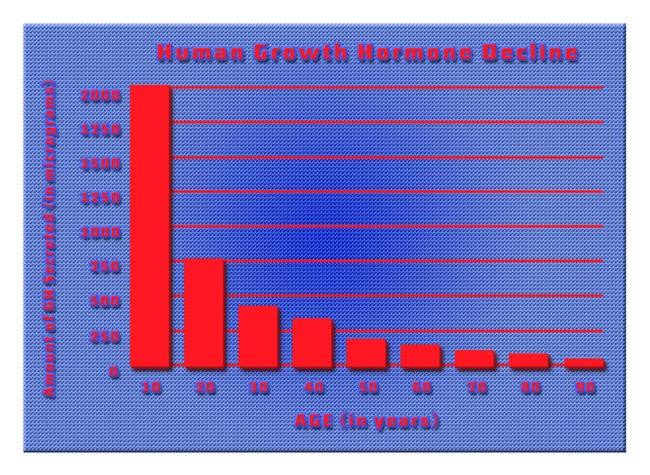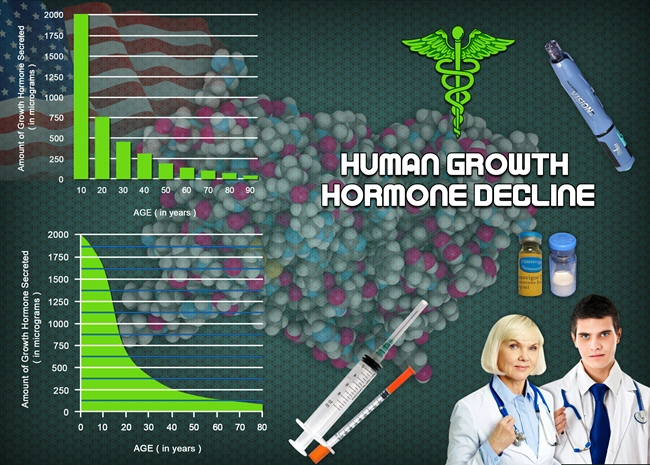
Video Link: https://vimeo.com/291314624
Video Download: Click Here To Download Video
Video Stream: Click Here To Stream Video
The Surprising Link Between Diabetes and Growth Hormone
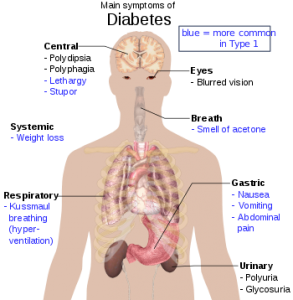 Diabetes. Like an ugly, insidious monster it is continually expanding, snagging more and more victims into its horrifying grip...with devastating consequences.
Diabetes. Like an ugly, insidious monster it is continually expanding, snagging more and more victims into its horrifying grip...with devastating consequences.
Blindness...amputations...nerve damage...weakened immune system...depression...poor circulation...dry, wrinkled skin...kidney problems...the list goes on and on, like a macabre parade.
And Low Growth Hormone Levels are a Huge Piece of the Puzzle
Diabetes is without a doubt a severe affliction. And it is also a terrible condition since it is usually preventable and reversible.
By making a few lifestyle changes and discovering the remarkable benefits of Growth Hormone Replacement Therapy, diabetes can be stopped dead in its tracks!
What is Diabetes?
Before we go any further, we need to define what diabetes is. After you eat and drink, your body breaks down the sugars in your blood and converts them into glucose, which is a pure sugar that provides you with energy.
For this to happen your pancreas gland manufactures a hormone called insulin.
In the case of diabetes, the pancreas either doesn’t produce enough insulin, or the insulin that it does produce is not efficient. The result is blood glucose levels skyrocketing while your other body’s cells are starving for energy. This results in the complications that come with diabetes.
There are two types of diabetes: type 1 and type 2. Type 1 is an immune system dysfunction and is often the result of genetics. Type 1 usually starts in adolescence or early adulthood.
Genetics can also play a role in the development of type 2 diabetes, but your lifestyle is often the culprit. Type 2 diabetes tends to occur after age 40 except for overweight children. Type 2 accounts for 90-95% of all diabetes cases in the United States and is the leading cause of death for this illness.
Treatment costs for type 2 diabetes exceed $1 billion annually.
Diabetes-Related Health Problems
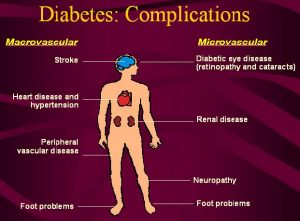
As mentioned earlier, diabetes can result in adverse and severe health consequences. Here are some of the more common ones:
- Damage to both large and small blood vessels. This can lead to a wide array of problems: cardiovascular disease, stroke, and damage to organs and extremities.
- Eye disease. Four eye problems are common effects of diabetes. Retinopathy is damage to vision as a result of injury to the blood vessels in the retina. Macular edema occurs when the macula (part of the retina) swells as a result of damaged blood vessels. This causes blurry vision. Cataracts and Glaucoma are two other severe eye conditions that are at increased risk of developing as a result of diabetes.
- Neuropathy (nerve damage). High glucose levels often cause this. Neuropathy can damage the feeling and movement nerves of the arms, hands, legs, feet, and the nerves of the body organs.
- Dry skin. Again, the recurring diabetic theme of damage to the small blood vessels and nerves impede blood flow to the skin; This often results in dry, weathered, and wrinkled skin.
- Dental problems. Diabetes increases the risk of inflammation to the gums and tooth decay as a direct result of...you guessed it...damage to the blood vessels and nerves that feed the gums and teeth.
- Depression, a weakened immune system, thyroid malfunctioning, kidney problems, and other health concerns occur far more frequently in people with diabetes as the disease progresses unchecked. The reasons are the same as mentioned above: damage to nerves and blood vessels.
More Bad News: Diabetes is Increasing at a Blistering Pace
According to some estimates, diabetes cases have increased by an incredible 700 per cent in the last 50 years. In fact, approximately 1 in 4 Americans either 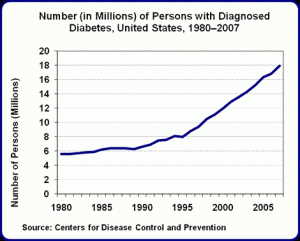 have diabetes or pre-diabetes (diminished fasting glucose). The diabetes juggernaut continues to steamroll forward, seemingly unstoppable.
have diabetes or pre-diabetes (diminished fasting glucose). The diabetes juggernaut continues to steamroll forward, seemingly unstoppable.
But Don’t Despair. This Malevolent Behemoth can be Stopped and Reversed
Hopefully, the case has been made for just how debilitating and deadly the complications arising from diabetes can be.
Now it’s time to let you know that Growth Hormone replacement therapy is a powerful battering ram that you can add to your arsenal to defeat this beast! Here’s how and why:
Both diabetics and obese people have low Growth Hormone (GH) levels.
When their levels of Growth Hormone are restored to normal, there is enough GH to act on two enzymes: lipoprotein lipase (LPL) and hormone-sensitive lipase (HSL). Lipoprotein controls lipolysis (the break down of triglycerides into free fatty acids) and lipogenesis (the accumulation of fat). Hormone-sensitive lipase also breaks down stored triglycerides into free fatty acids and glycerol.
Why is this important? Simple. Growth Hormone suppresses LPL. LPL breaks down triglycerides and results in the release of free fatty acids (FFA), which are absorbed by fat cells, thus causing weight gain.
Also, Growth Hormone causes the body to use FFA’s like an energy source. This reduces the use of sugars (glucose) and proteins for energy. Even better, Growth Hormone attacks fat exactly where it needs to: around the midsection.
With FFA’s being used for energy, the total count of FFA’s circulating in the body is dramatically slashed. Free fatty acids are bad actors that play a huge role in weight gain. They lower the release of Growth Hormone by the pituitary gland, and FFA’s are found in higher numbers in obese people.
Growth Hormone also lends a helping hand to the work of hormone-sensitive lipase. As mentioned earlier, HSL breaks down both triglycerides and glycerol. As with LPL, this frees FFA’s to be used as energy sources by the body, rather than accumulate as fat cells.
The glycerol part of the triglyceride must be removed to allow the FFA’s to escape from the fat cell. Growth Hormone accomplishes this mission.
By now it should be evident that Growth Hormone has a direct link in the battle against diabetes. Sadly, the potential of GH is often overlooked.
There are also other actions you can take to stop and reverse diabetes:
- Regularly monitor your blood glucose levels and keep them in the target range.
- Don’t smoke. Smoking can drastically increase the potential for severe complications by speeding up your heart rate, raising your blood pressure, and narrowing your blood vessels. Don’t make the destructive job of diabetes one bit easier.
- Moderate alcohol use.
- Regular exercise. Resistance, cardio, flexibility, and balance work are all helpful. Look to develop a well-rounded routine.
- Eat smart. Nothing dramatic here. For the most part, you can feel free to follow a healthy nutrition plan like anyone else. Fresh fruits and vegetables, lean protein, healthy fats, adequate hydration, and minimizing the super “no-no’s” will work for you as well as anyone without diabetes.
- Get adequate sleep. Deep, restorative sleep is a vital component of any health program that is all-too-often neglected. Diabetics often have sleep difficulties, and the body’s reaction to a lack of sleep mimics insulin resistance. Make getting a good night’s sleep a top priority.
Consider Nutritional Supplements
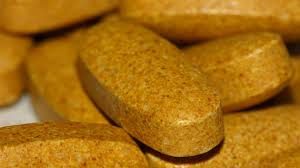
Once you have the basics covered, consider adding dietary supplements to the mix. Here are a few supplements that may be helpful:
- Chromium. This essential mineral boosts the action of insulin and moves glucose into the cells.
- Coenzyme Q 10. This powerhouse is one of the best sources of heart protection available.
- Alpha Lipoic Acid (ALA).
- Vitamin C. C lowers sorbitol levels. Sorbitol is the sugar that accumulates in the cells in the eyes and kidneys, with devastating consequences.
- Vitamin D. Vitamin D kick starts the genes that ramp up the production of cathelicidins, which attack bacteria, viruses, and a host of other germs.
- Vitamin E. This all-star nutrient plays a crucial role in glucose control and protects nerves and blood vessels from diabetes-induced damage. Just remember to take the right type of vitamin E: if it has dl before the type, just remember “don’t like.” DL =synthetic vitamin E, which is, at best, useless.
- B-Complex vitamins. These support nerve health, which is critical for everyone, especially diabetics.
- Magnesium. Studies have shown that magnesium can lower insulin resistance, which keeps blood sugar levels under control.
- Vanadyl Sulfate. This substance imitates insulin and therefore helps to stabilize blood sugar levels.
- Resveratrol. Another nutrient that has been shown to improve insulin sensitivity and lower blood glucose.
These dietary supplements are in addition to a good multivitamin.
You’re Not Helpless

There’s no debating the fact that a diagnosis of diabetes is depressing, and can quickly lead to despair and hopelessness. But you are not helpless in this battle.
Consider adding Growth Hormone replacement therapy to your anti-diabetes arsenal.
Contact us for the latest information on the miracles of Growth Hormone.
References
The role of growth hormone in diabetes mellitus.
https://www.ncbi.nlm.nih.gov/pubmed/3053958
Effects of growth hormone on glucose metabolism and insulin resistance in human
https://www.ncbi.nlm.nih.gov/pmc/articles/PMC5642081/
Contact Us Today For A Free Consultation
Dear Patient,
Once you have completing the above contact form, for security purposes and confirmation, please confirm your information by calling us.
Please call now: 1-800-380-5339.
Welcoming You To Our Clinic, Professor Tom Henderson.

- A Major Breakthrough in Anti-Aging Science is now Reality! [Last Updated On: October 12th, 2024] [Originally Added On: September 19th, 2020]
- All the Different Brands of Human Growth Hormone -- Guide [Last Updated On: February 10th, 2025] [Originally Added On: September 21st, 2020]
- Weight Loss Through HGH [Last Updated On: February 10th, 2025] [Originally Added On: September 24th, 2020]
- Did You Know: Sarcopenia is Increasing Among Senior Citizens at a Blistering Pace? [Last Updated On: February 8th, 2025] [Originally Added On: October 5th, 2020]
- Growth Hormone and Sleep [Last Updated On: February 9th, 2025] [Originally Added On: October 8th, 2020]
- Hormone Replacement Therapy Program Protocol Diary [Last Updated On: October 11th, 2024] [Originally Added On: October 9th, 2020]
- The Curse of Non-Alcoholic Fatty Liver Disease [Last Updated On: February 6th, 2025] [Originally Added On: October 11th, 2020]
- How Can I Get More HGH (Human Growth Hormone) Naturally? [Last Updated On: August 28th, 2025] [Originally Added On: August 16th, 2021]
- Cholesterol and Growth Hormone...the Truth May Surprise You! [Last Updated On: February 5th, 2025] [Originally Added On: October 7th, 2021]
- Growth Hormone FAQ's [Last Updated On: February 4th, 2025] [Originally Added On: October 8th, 2021]
- Growth Hormone: A powerful tool to battle Erectile Dysfunction [Last Updated On: February 6th, 2025] [Originally Added On: October 8th, 2021]
- How to buy Growth Hormone [Last Updated On: February 7th, 2025] [Originally Added On: October 8th, 2021]
- Testosterone Battles Diabetes [Last Updated On: February 3rd, 2025] [Originally Added On: October 8th, 2021]
- Growth Hormone protects your Adrenal Glands [Last Updated On: February 4th, 2025] [Originally Added On: October 8th, 2021]
- Buy Growth Hormone! [Last Updated On: February 9th, 2025] [Originally Added On: October 8th, 2021]
- Growth Hormone reduces Heartburn [Last Updated On: February 5th, 2025] [Originally Added On: October 8th, 2021]
- Growth Hormone and Nutraceuticals [Last Updated On: February 8th, 2025] [Originally Added On: October 8th, 2021]
- Growth Hormone and Depression [Last Updated On: February 3rd, 2025] [Originally Added On: October 11th, 2021]
- Growth Hormone and the Pituitary Gland [Last Updated On: February 1st, 2025] [Originally Added On: October 11th, 2021]
- Growth Hormone and Calorie Restriction. [Last Updated On: February 2nd, 2025] [Originally Added On: October 11th, 2021]
- Growth Hormone and Healthy Living Can Add Years to Your Life! [Last Updated On: February 2nd, 2025] [Originally Added On: October 11th, 2021]
- Welcome to Growth Hormone and Testosterone Therapy [Last Updated On: December 27th, 2024] [Originally Added On: October 11th, 2021]
- Human Growth Hormone Medical Guide [Last Updated On: May 18th, 2025] [Originally Added On: October 25th, 2021]
- HGH Female Blood Panel [Last Updated On: July 9th, 2022] [Originally Added On: October 28th, 2021]

